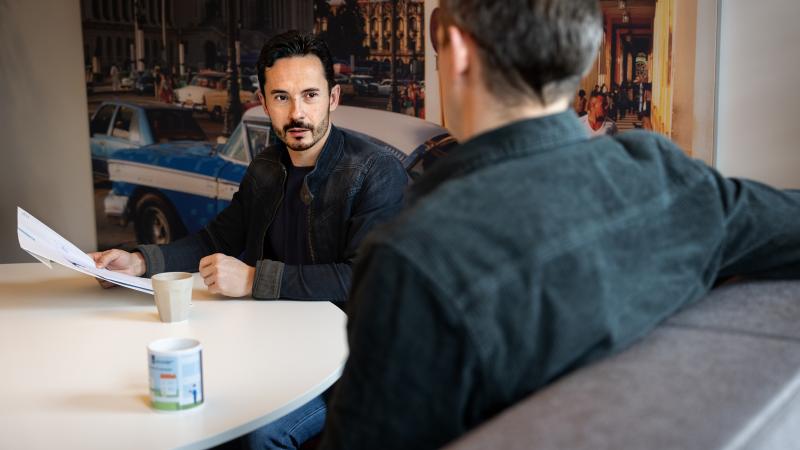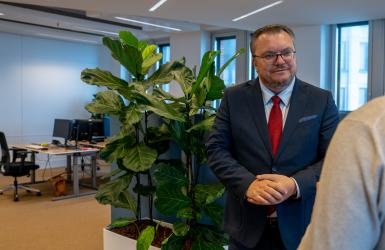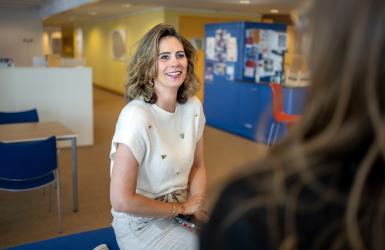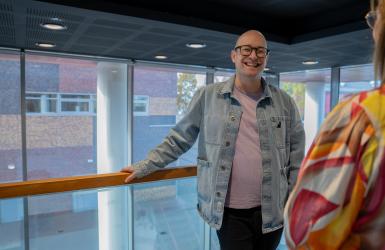The story of Diederick, corporate lawyer
‘We are the legal conscience of the IND’ Anyone who thinks the IND begins and ends with decision-making staff members is only seeing half…

Every now and then, I conduct an interview myself, because I think it’s important to stay in touch with daily practice.
Whoever applies for asylum in the Netherlands, does so in Ter Apel. This starts with the application process – the IND’s calling card. Colleagues in the application process conduct the reporting interviews and make sure the foreign nationals end up in the right procedure. As a senior staff member, Eric is mostly responsible for training new staff and controlling quality.
‘Education is really in my blood,’ Eric begins. ‘Before I joined the IND, I was a professional musician and had my own practice in guitar education. I prepared students for their admission to the conservatoire and sometimes taught at secondary schools. Somehow, teaching always finds me again. It is also funny that my father worked as an education specialist with the IND almost 20 years ago. He helped setting up the training programme for reporting interview and decision staff. So, this is how paths cross in a special way.
So it is not a complete coincidence that Eric ended up with the IND? ‘In retrospect perhaps not,’ Eric admits, ‘but when my father started here, music was still my passion, really. I had little attention for anything else. Still, I think his stories stuck with me and may have inspired me subconsciously. When I was searching a job outside music in 2017, he was the one who showed me a vacancy at the IND. I knew nothing whatsoever about aliens law or administrative law, only copyright law. So, I thought it was a strange idea, but when I looked at it closer, it sounded fun. Despite a lack of legal experience, I applied. And it turned out well.’
The doors of the IND opened for Eric in 2019. He started as an interview and decision staff member in Ter Apel, but switched quickly to the application process. Afterwards, he went on to become a senior staff member with his own portfolio. ‘A portfolio is a subject or theme within the process in which you have specialised. This can be the registration of applications, security or a specific target group. I have the portfolios training and – by extension – quality. I am responsible for the training programme and support the supervisors of interview staff. In addition, I regularly check if our interview staff can still do their work efficiently or if an adjustment is needed in the training programme. Every now and then, I conduct an interview myself, because I think it’s important to stay in touch with daily practice. I need this to maintain the quality of my senior position.
By now, Eric has seen a couple of training groups. He sees that the programme is improving continuously and is proud of what he can contribute to this. ‘Of course, we continuously collect feedback and we monitor the quality of our interviews. This way, I make sure that the training programme always aligns better with the needs of new staff. And eventually, this also benefits applicants. Together with colleagues from other offices, I am now creating an e-learning programme specifically for the role of staff in the application process. We don’t have such a programme yet. We use the same e-learning programme as the one for interview and decision staff, but that one isn’t always relevant. The new programme will be issued sometime this year. Hopefully, it will make another improvement to our services.’
Eric derives the most satisfaction from coaching his team and watching new staff members grow. ‘You do need certain skills for this,’ Eric admits. ‘Training is not for everyone, but I think I’ve got a talent for it. Fortunately, that’s also what my colleagues tell me. The best compliment I’ve ever had was about how I coach. For example, I have interview staff imagine that they’re in the decision-maker’s position for a moment after their interview. Why is it so important that you ask certain questions for the course of the process? Why do you have to think carefully about in-depth questions about how and why? This way, I try to make people self-sufficient. And they appreciate that.’
Eric is at the right place in Ter Apel. The pressure and buzz of the asylum world suit him well. ‘I think there’s hardly any other place where you get to know the world like this. As a matter of fact, I work on a world stage and am right in the middle of current developments. It is a kind of dynamics that triggers me personally and that I won’t get bored of any time soon.’

‘We are the legal conscience of the IND’ Anyone who thinks the IND begins and ends with decision-making staff members is only seeing half…

'Healthy and happy staff' When Evelien joined the IND in 2016, she only planned to spend two years here to gain experience.…

‘A single conversation can change someone’s day, week, or even their life’ Anyone who contacts the IND with questions about an application, a residence permit, or…